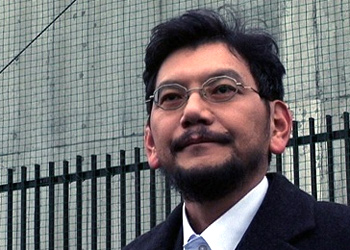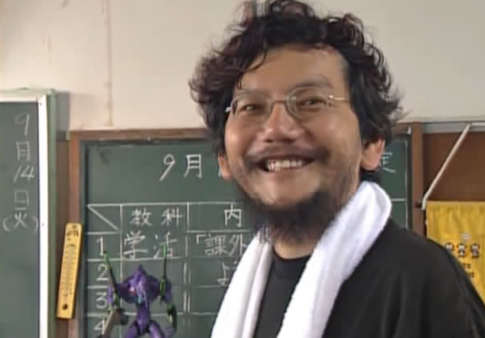<Back to Index>
- Animator and Film Director Hideaki Anno, 1960
PAGE SPONSOR

Hideaki Anno (庵野 秀明 Anno Hideaki, born May 22, 1960 in Ube, Yamaguchi) is a Japanese animator and film director. Anno is best known for his work on the popular anime series Neon Genesis Evangelion. His style has come to be defined by the touches of postmodernism that he injects into his work, as well as the thorough portrayal of characters' thoughts and emotions, often through unconventional sequences incorporating psychoanalysis and emotional deconstruction of these characters. He married comics artist Moyoco Anno in 27 April 2002.
Anime directed by Anno that have won the Animage Anime Grand Prix award have been Nadia: The Secret of Blue Water in 1990, Neon Genesis Evangelion in 1995 and 1996, and The End of Evangelion in 1997.
Anno was born in Ube City; he attended Wakō Kindergarten, Unoshima Municipal Elementary School, Fujiyama Municipal Junior High School, and Yamaguchi Prefectural Ube High School, where he was noted for his interest in artwork and making short films for Japanese Cultural Festivals.
Anno began his career after attending Osaka University of Arts as an animator for the anime series The Super Dimension Fortress Macross (1982 – 1983). Wrapped up in producing the DAICON III and IV Opening Animations with his fellow students, he was eventually expelled from Osaka.
However, he was not recognized talent until the release of his work on Hayao Miyazaki's 1984 film Nausicaä of the Valley of the Wind. Running short on animators, the film's production studio posted an ad in the famous Japanese animation magazine Animage, announcing that they were in desperate need of more animators. Anno, in his early twenties at the time, read the ad and headed down to the film's studio, where he met with Miyazaki and showed him some of his drawings. Impressed with Anno's work, Miyazaki hired him to draw some of the most complicated scenes near the end of the movie, and regarded his work highly.
Anno went on to become one of the co-founders of Gainax in December 1984. He worked as an animation director for their first feature length film, Royal Space Force: The Wings of Honneamise (1987), and ultimately became Gainax's premiere anime director, leading the majority of the studio's projects such as Gunbuster (1988) and Nadia: The Secret of Blue Water (1990 – 1991). However, Anno fell into a four year depression following Nadia — the series was handed down to him from NHK from an original concept by Hayao Miyazaki (of which Castle in the Sky is also partly based upon) and he was given little creative control.
Anno's next project was the anime TV series Neon Genesis Evangelion (新世紀エヴァンゲリオン Shin Seiki Evangerion) (1995 – 1996), which would be recognized as an influential animated series, championing a return to older styles of drawing and themes in Japanese animation and taking them to new heights of precision and depth.
It is plausible that Anno's four year period of depression was the main source for many of the psychological elements of the series and its characters, as he wrote down on paper many of the trials and tribulations of his condition. During the show's production, Anno became disenchanted with the Japanese "otaku" lifestyle, considering it a form of forced autism. For this and other reasons (although perhaps by design as well), Evangelion's plot became increasingly dark and psychological as the series progressed, despite being broadcast in children's television timeslot. Anno felt that people should be exposed to the realities of life at as young an age as possible, and by the end of the series all attempts at traditional narrative logic were abandoned, with the final two episodes taking place within the main character's mind.
The show did not garner high ratings at its initial time slot, though it was soon moved to a later, more adult oriented venue and became exceptionally popular throughout Japan.
After the ending of Evangelion, Anno received numerous letters and emails from fans, both congratulating him on the series and criticizing the last two episodes. Among these were death threats and letters of disappointment from fans who thought Anno had ruined the series for them. Soon, a project was launched to create a movie with a new ending for the series in 1997, eventually culminating in the controversial The End of Evangelion. (End of Evangelion displayed about a dozen letters from fans, including a few death threats.)
In September 1999, Anno appeared on the NHK TV documentary "Welcome Back for an Extracurricular Lesson, Sempai!", answering some Evangelion related questions, including the origin of the name Evangelion, and teaching children about animation production.
After Evangelion, Anno directed a significant portion of the 1998 anime series Kareshi Kanojo no Jijō (known in English as His and Her Circumstances or Kare Kano for short) — the first Gainax work to be directly adapted from previously written material — until disputes with both the show's sponsors and the original manga author ended in the director's departure, leaving the show in the hands of his protégé, Kazuya Tsurumaki. Since that dispute, Anno has gone on to work with Hayao Miyazaki and Studio Ghibli on several short films which have been shown at the Ghibli Museum.
The director has also made forays into live action films, beginning with Love & Pop (1998), a cinéma vérité - style film about enjo kosai ("compensated dating", a form of teenage prostitution) in Japan, of which a major portion was shot on miniature digital cameras with constantly shifting aspect ratios. He won Best New Director Award at 1998 Yokohama Film Festival for the film. Asumi Miwa who played the lead role won Best New Talent award. His second live action film, Shiki - Jitsu (2000) ("Ritual Day" or "Ceremonial Day"), is the story of a burnt out former animation director (played by popular indie director Shunji Iwai) who falls in love with a woman disconnected from reality. Though an experimental work like Love & Pop, this film was shot using the more traditional 2.35:1 aspect ratio and has a generally more polished presentation, eschewing the cinéma vérité grittiness of Anno's first live action film. This movie earned him Best Artistic Contribution Award at Tokyo International Film Festival and very positive reviews.
Anno's third live action film was Cutie Honey, released in the summer of 2004. A stark contrast to his earlier, more realist live action works, Cutie Honey is a lighthearted fantasy / superhero movie. Later in 2004, Anno supervised but did not direct the three part OVA, Re: Cutie Honey. The directors are Hiroyuki Imaishi (part 1), Takamichi Itō (part 2), and Masayuki (part 3). The movie is based on Go Nagai's 1973 manga and anime Cutie Honey.
Also released in 2004 was the movie Funky Forest (ナイスの森 Nice no Mori), in which Anno makes several acting cameos: as the student in the front row of the "Home Room!" skit sitting next to Hataru, in "Who's the Director?" as an animator who feels he is being overworked, and finally in "Singles Picnic" he is among the men awaiting females who never come.
On August 1, 2006, Hideaki Anno's official website was updated with job listings for key animators and production staff at a company he founded, Studio Khara. In September 2006, it is reported by the October edition of the Japanese animation magazine Newtype. On September 9, 2006, GAINAX's official website confirmed that Rebuild of Evangelion was in the works. The first three movies would be an alternate retelling of the TV series (including many new scenes, settings, backgrounds, characters), and the fourth movie would be a completely new conclusion to the story. Kazuya Tsurumaki and Masayuki would direct the movies while Yoshiyuki Sadamoto would provide character designs and Ikuto Yamashita mechanical designs. Shinji Higuchi would provide storyboards for the first movie. The first was launched in Summer 2007, and the second and third were planned to be launched in 2008, however, the second installment was released by itself on June 27, 2009. The third movie was expected to be released simultaneously with the fourth. On February 17, 2007, Anno published an official statement on the Japanese Yahoo Portal for the films regarding his personal involvement and goals in their production.
In October 2007, Hideaki Anno resigned from Gainax. In 2011, it was announced Anno is co-producing the Koinobori Pictures movie Kantoku Shikkaku ("Failed Director"), which will be directed by Katsuyuki Hirano and feature Yumika Hayashi.
Anno would design the opening sequence of the sci-fi anime TV series Space Battleship Yamato 2199.
